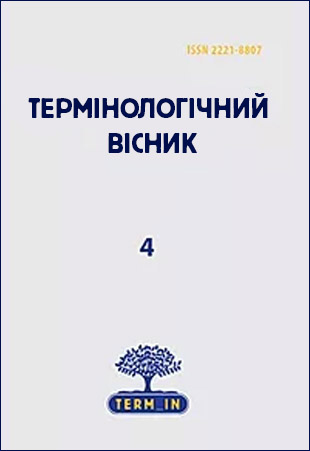Motivation for Naming Eponimic Terms: Theoretical and Practical Aspects

Founders
National Academy of Sciences of Ukraine,
Institute of Ukrainian Language of NAS
Publisher
Institute of the Ukrainian Language of National Academy of Sciences of Ukraine
Scientific journal Ukrainian Language is registered by the Ministry of Justice of Ukraine as print media (Certificate: Series КВ № 12180 – 1064 ПР of January 12, 2007).
Included in the list of printed scientific specialized editions of Ukraine (Order of MES of Ukraine no528 from 12.05.2015)
Back side of the journal
Lesia Malevych, Maia Dziuba
Information about the authors:
Lesia Malevych – Candidate of Philological Sciences, Assistant Professor of Ukrainian Studies Department of , National University of Water and Environmental Engineering (Rivne, Ukraine)
Maia Dziuba – Candidate of Philological Sciences, Assistant Professor, Head of Ukrainian Studies Department of , National University of Water and Environmental Engineering (Rivne, Ukraine)
e-mail: m.dzyuba@i.ua
Title: Motivation for Naming Eponimic Terms: Theoretical and Practical Aspects
Rubric: Theory and History of Terminology
Abstract: The article deals with the theoretical and practical aspects of the motivation for naming eponymic terms, e.g., terms named for a person, such as zakony Niutona, parkinsonizm (Newton’s laws, parkinsonism).
Terminology recognizes many approaches to the motivation for term naming due to the different types of relations between the motivation of term and its inner form (semantic aspect), between the motivation of term and its systemic importance (the organization of systemic relations in terminological vocabulary), between the motivation of term and the communication process (functional aspect).
Motivation for naming is defined as an integral characteristic of any term due to the fact that terminological system is secondary to the general language. Terminological motivation is interpreted as a structural semantic feature which helps to understand the interconnectedness of the other lexical units and their relation to a specific terminological field.
Types of motivation are often identified as a means of categorizing eponymic language units in separate thematic groups. Considering the defining principle of terminological nomination – the regularity of word-formative models – we suggest to view the established tradition of using proper names in specific terms for nominating certain categories of notions as a special motivation type – eponym motivation: pravylo Lentsa [zakon Lentsa] (Lenz’s rule [Lenz’s law]) (physics) – law named after the physicist Heinrich Lenz who formulated it in 1834.
Motivation for naming eponymic terms is defined, first of all, by the direct relation to the denoted object, its definition and place in terminological system which can be both explicit or hidden. Eponymic terms can be characterized by all 10 three motivation types: word-formative and morphological, syntactic, semantic. Hidden motivation can be discovered with the help of etymological analysis or studying extra-linguistic factors, e.g., syndrom Van-Hoha (Van Gogh syndrome) is named after the famous Dutch painter Vincent van Gogh. So, inner form is able to preserve diverse structure of knowledge about linguistic and extra-linguistic reality which is particularly important in terms of anthropocentrism – methodological principle which plays the key role in studying of motivation, i.e., fixation of the connection (which speaker is aware of) between form and content of the lexeme in relation to the phenomena of linguistic and extra-linguistic reality.
Theoretical and practical problems of motivation for naming eponymic terms needs further terminological research, in particular, based on the principles of the anthropocentric paradigm.
Keywords: term-eponym, terminological motivation, syntactic motivation, semantic motivation, word-formation and morphological motivation.
References:
- Blinova, O.I. (1981). Termin i ego motivirovannost’. Teminologiya i kul’tura rechi. (pp. 28–37). Moscow: Nauka (in Rus.).
- Gerd, A.S. (1977). Vvedenie v etnolingvistiku. St. Petersburg: Izd-vo Sankt-Peterburgskogo un-ta (in Rus.).
- Danilenko, V.P. (1977). Russkaya terminologiya: Opyt lingvisticheskogo opisaniya. Moscow: Nauka (in Rus.).
- Deshcho pro Svit Bozhyi (1871). Kyiv (in Ukr.).
- Kiyak, T.R. (1989). O vidah motivirovannosti leksicheskih edinic. Voprosy yazykoznaniya, №1, 98–107 (in Rus.).
- Kondrat’ev, D.K. (1990). Sovremennaya medicinskaya terminologiya i problemy ee perevoda. Semantiko-sintaksicheskie trudnosti perevoda nauchno-tekhnicheskoj literatury i dokumentacii. Chast’ І. (pp. 123–127). Kaluga (in Rus.).
- Lejchik, V.M. (1982). Lyudi i slova. Moscow: Nauka (in Rus.).
- Lejchik, V.M. (2007). Terminovedenie: predmet, metody, struktura. Moscow: Izd-vo LKI (in Rus.).
- Malevych, L.D. (2010). Antropotsentryzm v ukrainskii naukovii terminolohii i terminohrafii. Ukrainska mova u XXI stolitti: tradytsii i novatorstvo : Tezy dopovidei II Vseukrainskoho forumu molodykh uchenykh (Kyiv, April 21–23, 2010) (pp. 138–140). Kyiv: Speis-Inform, FOP Hudymenko (in Ukr.).
- Mykhailyshyn, B.P. (1994). Z istorii terminiv-eponimiv. Movoznavstvo: naukovo-teoretychnyi zhurnal, N 4–5, 45–50.
- Mykhailyshyn, B.P. (1992). Pryroda i status terminiv-eponimiv. Problemy ukrainskoi naukovo-tekhnichnoi terminolohii: tezy dopovidei 1 Mizhnarodnoi naukovoi konferentcii (pp. 58–59). Lviv (in Ukr.).
- Mishchenko, A.L. (2013). Linhvistyka fakhovykh mov ta suchasna model naukovo-tekhnichnoho perekladu. Vinnytsia: Nova knyha (in Ukr.).
- Panko, T.I., Kochan, I.M., Matsiuk, H.P. (1994). Ukrainske terminoznavstvo. Lviv: Svit (in Ukr.).
- Reformatskij, A.A. (1966). Kak nazvat’ novyj himicheskij element? Voprosy kul’tury rechi, Vyp.7, 89–94 (in Rus.).
- Superanskaja, A.V., Podol’skaja, N.V. & Vasil’eva, N.V. (1989). Obshhaja terminologija. Moscow: Nauka (in Rus.).
- Tsymbal, N.A. (2014). Metodolohichni aspekty motyvolohichnykh doslidzhen. Movoznavstvo : naukovo-teoretychnyi zhurnal, №4, 88–92 (in Ukr.).
- Shelov, S.D. (1995). Ponyatijnaya struktura terminologii i opredelenie terminov (CHast’ 2). Nauchno-tekhnicheskaya terminologiya, №1, 17–24 (in Rus.).
- Shcherban, N.P. (1974). Antroponim u skladi frazeolohichnykh odynyts (na materiali nimetskoi movy). Movoznavstvo : naukovo-teoretychnyi zhurnal, №6, 73–76 (in Ukr.).


